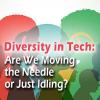The Sustainability Imperative
As organizations struggle to define a strategy that balances purpose and profit, opportunities are increasingly emerging to take the lead in sustainability initiatives. Front-line advances in areas such as net-zero emissions, AI-powered solutions for the underserved, precision agriculture, digital healthcare, and more are delivering business benefits, while simultaneously contributing to the realization of the UN’s 17 SDGs. We provide the expert thinking, debate, and guidance to help your organization reposition and transform in the era of sustainability.
Recently Published
Article
Closing the DEI Gap
Benjamin Duke hammers home the need for more actions and fewer words. He highlights how companies have stated their verbal commitment to DEI, but their results do not reflect these commitments. Black employees are left feeling a misalignment between their company’s public comments about supporting racial justice while failing to address the concerns of their Black employees.
As a former technology industry executive and current VP responsible for the development of Black and Latinx technology professionals, Cutter Fellow Robert D. Scott is uniquely positioned to share insights into the hiring, retention, and advancement myths that are pervasive in corporate America. He explains why the needle is not moving, and asks, “What needs to happen to truly make a system change this time, versus the many previous attempts?”
In this issue, we hope to remind CEOs of the challenges that remain unaddressed and out of balance when it comes to diversity in technology. The authors speak from personal experiences, extensive research, and a deep desire to contribute toward changing the diversity, equity, and inclusion (DEI) narrative. They share proven best practices and procedural changes that must be followed so that this time, the outcomes of CEOs’ commitments will look differently, and those impacted will finally be able to have more equitable work and life experiences.
Noelle Silver focuses on the challenges women of color and other underrepresented groups face in the technology industry at all points along the career continuum. She discusses how hiring and promotion practices aren’t designed to embrace the uniqueness of these women, often resulting in their inability to be given a fair chance at open positions.
Damon Carter shares examples of what hasn’t worked in diversity, equity, and inclusion (DEI) initiatives and provides practical solutions. While calling for progressive leadership, he outlines a key pathway to launching a successful DEI journey with measurable and sustainable results.
In a recent webinar, Cutter Fellow William Ulrich and Giovanni Traverso explored the circular economy, the strategic challenges it presents, and business architecture’s role in transitioning an organization into becoming a player in the sustainable economy. This Advisor shares the Q&A session that followed the presentation. We hope the advice will spark some new ideas for how your organization can participate in the circular economy.
Business model optimization plays an important role in transitioning to the circular economy. Using an example from an automotive manufacturing company, this Advisor explores how business architecture enables this transition while concurrently enabling organizations to streamline costs, increase revenues, and achieve related strategic objectives.
Environmental intelligence (EI) is an effective combined use of data science, AI, and other digital technologies such as IoT to provide the meaningful insight needed to address these challenges and mitigate the effects of environmental change. This Advisor examines how EI can help in collecting and analyzing environmental data to understand the cause and impact of environmental changes and to predict potential environmental risks facing us.

















